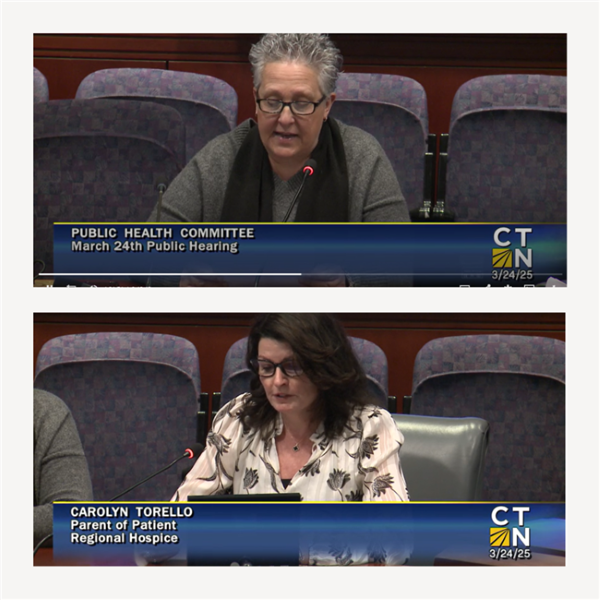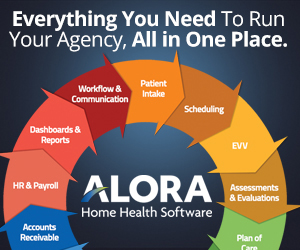 |
||||||||||||||||||||||||||||||||
| March 27, 2025 | ||||||||||||||||||||||||||||||||
A few weeks ago, the Aging Committee raised and heard from the public on SB 1344, An Act Concerning Homemaker-Companion Agencies (HCAs). This bill focused on establishing training standards and hours for HCA direct care workers. Simultaneously, a new legislative committee (the Government Oversight Committee) raised a similar bill in SB 1468, An Act Concerning Government Accountability, which also contained proposed language for HCA training standards and hours.
Testimony:
The Association and a few of its members testified in support of standards with some suggested amendments. Meanwhile, the Aging Committee chose not to move SB 1344 forward while SB 1468 is still alive and moving through the legislative process. The Association has been collaborating with the Home Care Association of America Connecticut (HCAOA CT) on some amended proposed language to be submitted later this week. Stay tuned for future developments.
On Monday, March 24th, members of the statewide Pediatric Hospice Work Group offered testimony in strong support to their recommendations to the Public Health Committee as outlined in SB 1540. Leading the charge was ToniAnn Marchione (Co-Chair of the work group and Pres/CEO of Regional Hospice) along with Carolyn Torello (a parent whose child received care at Regional Hospice). See below links to the testimony offered by our membership.
Source: McKnights Home Care, March 5, 2025
The National Alliance for Care at Home, the leading home care advocacy organization, has weighed in on a House budget resolution that threatens to cut billions of dollars from Medicaid.
“Medicaid is a complex program and changes to one part of the statute may have unanticipated negative outcomes on other aspects of services, financing, or reimbursements,” the Alliance said Wednesday in a statement. “We encourage Congress to be extremely careful to avoid making changes that could lead to unintended outcomes. We stand ready to provide our expertise to help strengthen Medicaid for all individuals and providers.”
Source: March 18, 2025
Alexandria and Washington, D.C. – On Thursday, March 13th, the Medicaid and CHIP Payment and Access Commission (MACPAC) released its semi-annual report, which included three chapters and five recommendations. (See analysis from the National Alliance for Care at Home HERE and HERE.)
Two recommendations in the MACPAC report concern home and community-based services (HCBS):
Source: Alliance Daily, March 20, 2025
On March 18, 2025, the National Alliance for Care at Home submitted comments to the Drug Enforcement Administration (DEA) in response to its proposed rule, Special Registrations for Telemedicine and Limited State Telemedicine Registrations.
(See our prior Alliance Daily article covering the proposed rule in greater detail.)
While supporting DEA’s goals to prevent drug diversion, the Alliance expressed strong concerns that the proposed rule would significantly hinder timely access to necessary controlled medications for hospice and palliative care patients. In comments submitted to the DEA, the Alliance emphasized that subjecting hospice practitioners to in-person medical evaluation requirements under the Ryan Haight Act would disastrously upend decades of successful hospice care delivery and urged the DEA to, among other things, explicitly exclude these practitioners to eliminate any confusion, and to revise the proposed rule to ensure it clearly aligns with legislative intent, protect vulnerable patients, and prevent any disruptions in care.
The proposed rule received almost 42,000 comments — including a number from Alliance members — a significant increase over the 2023 DEA telemedicine rule, which received slightly over 35,000 comments.
We thank our members for their contributions and engagement in crafting these recommendations, as their invaluable feedback and frontline experiences significantly informed our comments.
Source: Hospice News, March 13, 2025
Several hospice nurses have emerged as social media influencers and authors who aim to demystify death and dying for the general public.
Individually and collectively, these nurses have amassed millions of social media followers on platforms such as TikTok, Facebook, Instagram and YouTube. A number have also written books about their experiences as hospice nurses and the lessons they’ve learned about the end-of-life experience for many families.
Source: McKnights, March 6, 2025
Even though there are requirements and proven benefits for starting home healthcare on time, about 30% of people’s care is delayed. People living in the most underserved areas had a 13% higher risk for delayed care compared to those in the least disadvantaged areas, according to findings from a new study.
Compared to patients who received a timely visit (within 48 hours after hospital discharge), those with delays were more likely to be over 80 years old, non-Hispanic Black or Hispanic and living in more disadvantaged neighborhoods, the data showed.
|
||||||||||||||||||||||||||||||||
| Past Issues | Subscribe | cthealthcareathome.org | Advertise with Us | ||||||||||||||||||||||||||||||||








